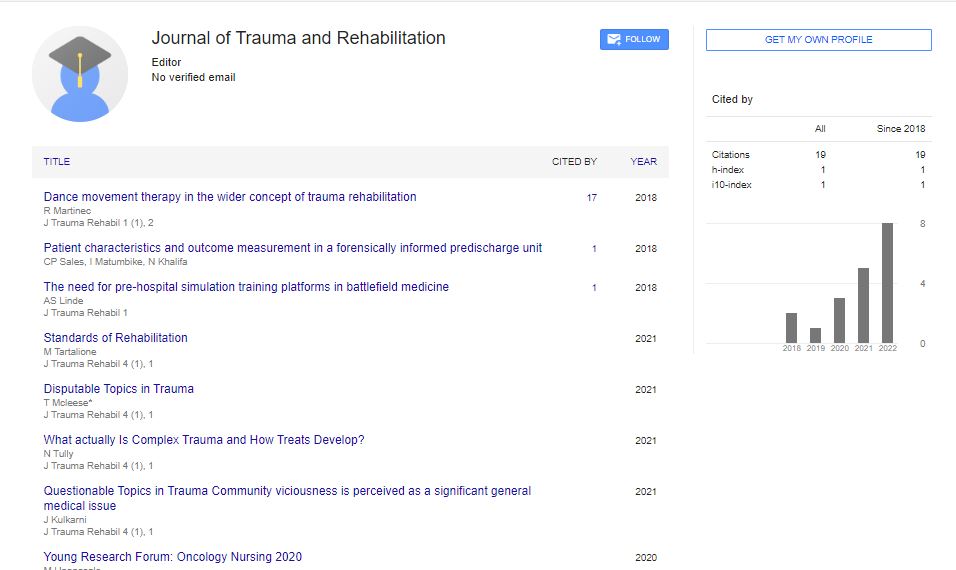Perspective, J Trauma Rehabil Vol: 6 Issue: 4
Impact of Emotional Trauma on Pain Reverberations
Castro Spehr*
1Department of Psychology, National University of Ireland, Galway, Ireland
*Corresponding Author: Castro Spehr,
Department of Psychology, National
University of Ireland, Galway, Ireland
E-mail: castspe@nuigalway.ie
Received date: 24 November, 2023, Manuscript No. JTR-24-127961;
Editor assigned date: 27 November, 2023, PreQC No. JTR-24-127961 (PQ);
Reviewed date: 11 December, 2023, QC No. JTR-24-127961;
Revised date: 18 December, 2023, Manuscript No. JTR-24-127961 (R);
Published date: 26 December, 2023, DOI: 10.4172/Jtr.1000145
Citation: Spehr C (2023) Impact of Emotional Trauma on Pain Reverberations. J Trauma Rehabil 6:4.
Description
Emotional trauma, an often silent and profound force, has the power to develop enduring reverberations within an individual's emotional and physical landscape. Beyond the immediate emotional distress, the impact of such trauma extends to the field of physical pain, resulting in a complex interaction that shapes an individual's well-being. At the core of the impact lies the recognition that emotional trauma is not confined to the realm of emotions alone; it establishes a tangible connection with physical sensations, particularly pain. The intertwining of emotional and physical fields manifests in various ways, influencing the body's response to pain stimuli and altering the overall pain experience. Emotional trauma can sensitize the nervous system, heightening the perception of pain. The body's stress response, caused by trauma, can lead to increased muscle tension, inflammation and altered discomfort boundaries. Individuals who have experienced emotional trauma may find themselves more susceptible to chronic pain conditions, such as fibromyalgia or tension headaches, where the lines between emotional distress and physical discomfort blur.
The impact of emotional trauma on pain reverberations is notably observed in the context of chronic pain conditions. The persistent nature of emotional distress can contribute to the development and exacerbation of conditions where pain becomes a constant companion. Individuals analyzing emotional trauma may experience a heightened sensitivity to pain stimuli and the emotional burden can magnify the subjective experience of physical discomfort. The reciprocal relationship between emotional well-being and pain highlights the need for a comprehensive strategy to addressing both aspects. The impact of emotional trauma on pain reverberations extends beyond the physiological to encompass the psychological dimensions of an individual's life. Certain ways to deal the mechanisms, such as avoidance or hyper-vigilance, may emerge as adaptive responses to the emotional distress associated with trauma. Trauma's resonance in pain perception is further highlighted by the influence on an individual's overall quality of life. The chronic nature of pain resulting from emotional trauma can erode one's ability to engage in daily activities, disrupt sleep patterns and strain interpersonal relationships.
The reverberations of pain become integral components of an individual's narrative, shaping how they navigate the world and interact with others. The impact of emotional trauma on pain reverberations also carries societal implications. Individuals dealing with chronic pain may face challenges in accessing appropriate healthcare, as the interconnected nature of emotional and physical well-being requires a comprehensive and multidisciplinary approach. Societal awareness and understanding are important to dismantle the stigma surrounding chronic pain and acknowledging the role of emotional trauma in shaping these experiences. Addressing the impact of emotional trauma on pain reverberations necessitates a multifaceted approach that acknowledges the interconnectedness of emotional and physical well-being. Therapeutic interventions, such as psychotherapy, play a pivotal role in revealing the emotional threads of trauma and providing individuals with tools to manage both emotional distress and pain. Integrative approaches that combine psychological support with pain management strategies provide a comprehensive framework for recovery. Moreover, fostering resilience becomes an integral aspect of navigating the impact of emotional trauma on pain reverberations.
Conclusion
Building emotional resilience involves developing adaptive mechanisms, enhancing social support networks and cultivating a sense of empowerment in the face of adversity. Mindfulness practices, relaxation techniques and stress-reduction strategies contribute to developing a more balanced emotional and physical landscape. The impact of emotional trauma on pain reverberations represents a complex interaction between emotional distress and physical sensations. The enduring resonance of trauma within an individual's life highlights the importance of recognizing and addressing the interconnected dimensions of emotional and physical well-being. By acknowledging the profound impact emotional trauma has on pain perception, individuals and the broader healthcare community can work together to foster understanding, provide support and pave the way for a more integrated and compassionate approach to healing.
 Spanish
Spanish  Chinese
Chinese  Russian
Russian  German
German  French
French  Japanese
Japanese  Portuguese
Portuguese  Hindi
Hindi 